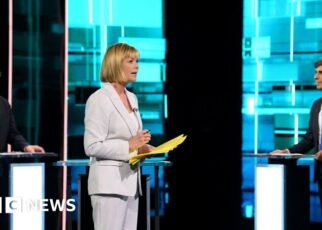[ad_1]
ITV has agreed to add a British Sign Language version of an election debate programme to its on-demand platform, after pressure from a deaf campaigner.
The debate between Prime Minister Rishi Sunak and Labour leader Sir Keir Starmer, aired on Tuesday evening, included subtitles but not a live translation.
Katherine Rowley told BBC News she “felt very disappointed” that she could not follow the debate live.
In response to a letter from Ms Rowley’s lawyer, ITV said signing on live broadcasts “involves a considerable degree of planning and additional resource”.
The Communications Act 2003 says at least 5% of broadcasters’ content must be translated into sign language.
The Act says most content should include subtitles. But many who use BSL as their first language struggle with English subtitles because, studies suggest, deaf people’s reading ability is lower than average.
Miss Rowley’s lawyer, Chris Fry, told BBC News that equality laws should be updated to close the 5% target “loophole” to make sure key content in the public interest is available in accessible formats.
“My kids tune into Horrible Histories sometimes, and they’ve got BSL on there,” he says.
“If you’re going to provide it on kids’ broadcasts, great – but what makes broadcasts on the elections less important than that?”
He said there are additional accessibility issues around elections, such as visually impaired people receiving leaflets through the post.
On 30 May, Mr Fry sent a pre-action legal letter to ITV, to pressure it into including live signing in its debate on 4 June.
ITV’s response, sent on 31 May, said it recognised Miss Rowley would be “disappointed” sign language could not be provided for the live broadcast, but that she had “no basis to bring a claim” of discrimination.
It said a BSL version of its election debate programme would be available on its on-demand platform within 24 hours of the broadcast.
ITV added in its letter, seen by BBC News, that accessibility and inclusion were “extremely important” and “we strive continuously to improve the level of accessibility across our channels and platforms”.
The broadcaster has not responded to a request for further comment.
Miss Rowley said on Wednesday: “I felt very disappointed that I couldn’t follow last night’s debate. It’s an important time of our life, voting.”
“Equality shouldn’t have to be an afterthought,” she added.
In 2021, Miss Rowley – a member of the Labour Party – won a claim against the government after two of its televised Covid briefings did not include sign language.
Mr Fry is calling on political parties and TV networks to provide BSL translations of their broadcasts and manifestos during the election campaign.
The BBC said on Wednesday that it would include live British Sign Language and subtitles on its leader debates, as part of its aim “to make this election the most accessible to date”.
Its first election debate, with representatives from the seven biggest parties, is on Friday 7 June. ITV’s next one is on Thursday 13 June.
[ad_2]
Source link freeslots dinogame telegram营销



